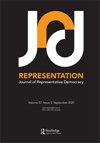感觉像一种状态:欲望、否认和权威的重铸
Q2 Social Sciences
引用次数: 0
摘要
在《感觉像一个国家》一书中,达维娜·库珀(Davina Cooper)以支持进步、变革的政治的方式,重新定义了作为一个国家可能意味着什么。这种重新概念化受到她参与的一系列法律剧的支持和启发,其中加拿大,美国和英国(新)自由主义国家的保守基督徒“退出”(例如拒绝服务和商品)LGBTQ个人和团体,从而促使国家相互退出(例如拒绝许可证或撤销慈善地位)。结合理论和经验数据,库珀认为,这些相互退出的戏剧——特别是那些涉及保守派基督徒作为国家行动者(如养父母、县文员等)的戏剧——挑战了国家有序、垂直、同质和完全不同于它所统治的社会的观念。库珀的既定目标是对国家进行重新概念化,她欢迎这一挑战,并围绕她认为保守派基督教退出所提出的两个问题进行了回应。第一个问题是国家部分的问题:它们是什么,它们如何看待彼此之间的关系?在回答这个问题时,她在本书的核心部分大量引用了法律戏剧,以强调国家的多元和异质性。库珀提出的第二个问题与国家责任有关。她问道:通过把国家看作是多元的和异质的,什么样的实际和想象的可能性是可能的?在这里,库珀关注的是戏剧和情爱在一种新状态的想象和运作中可能扮演的角色。最后,她提出了预言性的角色扮演(即通过人民法庭和免费大学等场所在微观尺度上模仿国家地位的行为),作为进步人士可以在“进步的、变革的关键”中实验和参与国家地位的一种方式(库珀,2019年,第27页)。本文章由计算机程序翻译,如有差异,请以英文原文为准。
Feeling Like a State: Desire, Denial, and the Recasting of Authority
In Feeling Like a State, Davina Cooper sets out to reconceptualise what it could mean to be a state in ways that support a progressive, transformative politics. This reconceptualisation is supported and inspired by her engagement with a series of legal dramas in which conservative Christians in the (neo)liberal states of Canada, the United States, and the United Kingdom ‘withdraw’ (e.g. refuse services and goods) from LGBTQ individuals and groups, thereby prompting the state to reciprocally withdraw (e.g. refuse licenses or revoke charitable status) from them. Drawing on a combination of theory and empirical data, Cooper posits that these reciprocal dramas of withdrawal – particularly those that involve conservative Christians operating as state actors (e.g. foster parents, county clerks, etc) – challenge conceptions of the state as orderly, vertical, homogenous and wholly distinct from the society over which it governs. Cooper – whose stated objective is a reconceptualisation of the state – welcomes this challenge, organising her response around two questions she sees as posed by conservative Christian withdrawal. The first is a question of state parts: what are they and how do they conceive of their relationship[s] to each other? In answering this question, she draws heavily on the legal dramas at the heart of this book in order to emphasise the plural and heterogeneous nature of the state. The second question Cooper raises is one regarding state responsibility. She asks: What practical and imaginative possibilities are made possible by thinking of the state as plural and heterogenous? Here, Cooper’s focus is on the role that play and the erotic could have in both the imagining and the functioning of a new kind of state. She concludes by offering prefigurative role-play (i.e. the act of imitating statehood on a microcosmic scale through venues such as people’s tribunals and free universities) as one modality by which progressives can experiment and engage with statehood in ‘a progressive, transformative key’ (Cooper, 2019, p. 27).
求助全文
通过发布文献求助,成功后即可免费获取论文全文。
去求助
来源期刊

Representation
Social Sciences-Sociology and Political Science
CiteScore
3.50
自引率
0.00%
发文量
31
期刊介绍:
This change in scope follows two paths. Firstly, it seeks contributors who are interested in exploring the interface between democratic practice and theory. In particular, this focus seeks contributions that apply theoretical insights to actual examples of current practice. Secondly, while not neglecting the current focus of the journal, we would like to expand its international coverage so that the journal will offer our readers insights in the state of democracy worldwide.
 求助内容:
求助内容: 应助结果提醒方式:
应助结果提醒方式:


